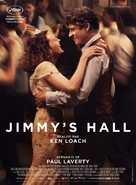Reviews provided by RottenTomatoes
Farran Smith Nehme, New York Post: There's an essential kindness about "Jimmy's Hall," so it's no surprise that it wrings real hope from a downbeat conclusion. Read more
Scott Foundas, Variety: Ken Loach has taken a despicable episode of modern Irish history -- the 1933 deportation without trial of one of its own citizens, James Gralton -- and made a surprisingly lovely, heartfelt film from it with Jimmy's Hall. Read more
Mike D'Angelo, AV Club: Footloose set in 1930s Ireland, basically, with jazz in lieu of Kenny Loggins. Read more
Lindsey Bahr, Associated Press: While this deeply romanticized and fictionalized account of a little-known underdog might not serve you in any trivia capacities, it's also a worthy and loving story of humanity in the face of oppression. Read more
Ben Sachs, Chicago Reader: The portrait of Gralton and his comrades is so rich and heartfelt that one might easily overlook all the moralizing. Read more
Neil Young, Hollywood Reporter: What we're left with is an odd, only fitfully engaging hybrid of The Quiet Man and Footloose, which neither packs much of a punch nor is particularly nimble on its feet. Read more
Sheri Linden, Los Angeles Times: [A] charming but surprisingly soft-focus movie ... Read more
Elaine Teng, The New Republic: By trying to give Jimmy's Hall the gravitas of a national struggle, Loach obscures his story. Elegant but uneven, Jimmy's Hall becomes one history lesson too much. Read more
Stephen Whitty, Newark Star-Ledger: "Jimmy's Hall" is a nice place to visit, for a while, to look and listen and have a chat or two. It means well, to be sure. But after half-an-hour, you may find yourself looking at your watch and starting to make other plans. Read more
Graham Fuller, New York Daily News: With "Jimmy's Hall," Ken Loach creates a quiet but compelling drama about a real-life story. Read more
Stephen Holden, New York Times: One of the pleasures of "Jimmy's Hall," a likable period piece directed by the social-realist British filmmaker Ken Loach, is its unswerving belief in old-fashioned populist heroes. Read more
Steven Rea, Philadelphia Inquirer: There's humanity here, on all sides, and a gentle wisdom beneath the raging rhetoric. Read more
John Hartl, Seattle Times: Loach is clearly on Gralton's side, but he's remarkably evenhanded about it. Norton is a formidable villain, while Ward is just vulnerable enough to make the showdown dramatically persuasive. Read more
Colin Covert, Minneapolis Star Tribune: Loach, who has told similar stories two dozen times before, delivers his trademark messages with graceful skill. Read more
Calvin Wilson, St. Louis Post-Dispatch: Working from a fact-based screenplay by his longtime collaborator Paul Laverty, Loach addresses a theme that resonates throughout his work: the effect of the political on the personal. Read more
Liam Lacey, Globe and Mail: As dramatically stilted as Jimmy's Hall is, it has an undeniably appealing integrity ... Read more
Bruce Demara, Toronto Star: A great cast along with Loach's trademark realism and capable storytelling deliver a tale of quiet power, with an ending that is sure to deliver of a jolt of righteous outrage. Read more
Dave Calhoun, Time Out: An unusual story, vividly and intelligently told, and one that leaves you with a stirring sense of joy, injustice and hope. If this truly is the end for Loach, he'll be missed. Read more
Marsha McCreadie, Village Voice: Like the shot of folks on bicycles pedaling away in support of their folk hero Jimmy at the film's conclusion, it's real populism at work. Read more
Bilge Ebiri, New York Magazine/Vulture: This isn't a nuanced, sober work. It's a film that stacks the deck ideologically, but does so with such energy and freewheeling charm that you roll with it. Read more
Ann Hornaday, Washington Post: In many ways, "Jimmy's Hall" shows what the pursuit of happiness can look like, and why it's worth a revolution to protect it. Read more

